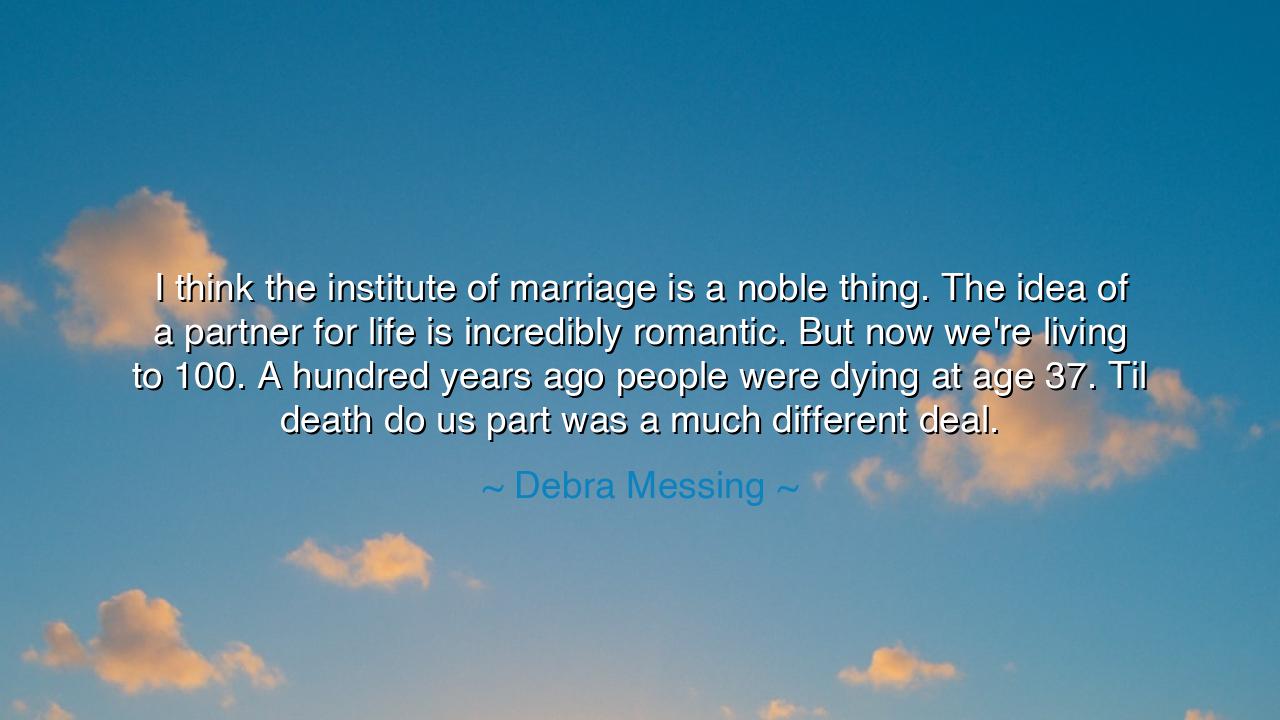
I think the institute of marriage is a noble thing. The idea of a
I think the institute of marriage is a noble thing. The idea of a partner for life is incredibly romantic. But now we're living to 100. A hundred years ago people were dying at age 37. Til death do us part was a much different deal.






In the words of Debra Messing, “I think the institute of marriage is a noble thing. The idea of a partner for life is incredibly romantic. But now we’re living to 100. A hundred years ago people were dying at age 37. Til death do us part was a much different deal.” These words reveal not only the beauty of love’s covenant but also the shifting weight of its burden across the centuries. They remind us that the vow of union, once bound by the brevity of life, has grown longer and heavier with the extension of human years. What once meant two decades together now may mean six or seven—a lifetime not of fleeting joy, but of endurance, renewal, and profound devotion.
The ancients regarded marriage as both duty and poetry. In Greece, the joining of husband and wife was seen as a bond that secured not only love but the stability of the household and the city-state. In Rome, marriage was both contract and covenant, carrying the power to bind families, wealth, and legacy. Yet even in these ancient times, the average life was short, and vows of lifelong companionship were measured in far fewer years than in our modern age. To pledge “til death do us part” then was no less sacred, but it carried a different weight: it was a promise within a span often cut short by illness, war, or fate.
Now, as Messing observes, the measure of life has stretched like an unbroken thread across a century. The partner for life now may share not merely the flowering of youth, but the withering of old age, the changing of bodies, the shifting of desires, the transformation of entire selves. What was once a season may now become an epic, demanding not only passion but patience, not only romance but resilience. To remain united across such a long road requires not a single love, but many loves reborn within the same bond, as two souls continually choose each other again and again.
History offers us examples of such endurance. Think of John and Abigail Adams, whose letters across years of separation reveal a marriage both practical and profoundly affectionate. They endured war, politics, and distance, yet their love was not a single moment of passion but a continual renewal of choice. Had they lived to 100, their bond would have stretched further still—but the principle remains: marriage is noble not because it is easy, but because it calls two souls to walk together through the full arc of human existence, however long it may last.
Yet Messing’s reflection also carries a quiet challenge. To bind oneself for a century is no small matter. The romantic dream of one love for life must be tempered with the truth that people change, that the self of 20 may be unrecognizable at 60 or 90. And still, the vow calls us to adapt, to grow, to see the beloved anew as time reshapes them. The nobility of marriage lies not only in devotion to who someone was, but in devotion to who they become.
The lesson, then, is this: do not take lightly the vow of “til death do us part.” It is not a poetic flourish but a summons to a lifelong journey. To honor it in this age requires creativity, forgiveness, humor, and the courage to love through many seasons. Marriage is no longer a brief union before an early grave—it is an odyssey that can span a century. To remain faithful is to remain explorers of one another’s hearts, willing to rediscover and fall in love anew, again and again, until the final breath.
And what should you do? If you choose marriage, choose it with eyes open, with reverence for its nobility and with readiness for its trials. Do not expect a single unchanging romance, but prepare to nurture many renewals of love within one union. Mark anniversaries not only as dates of survival, but as victories of the heart. And when the weight of years presses hard, remind yourself that this vow, though longer than ever before, is still the most romantic covenant of all: the promise to walk together, through all the transformations of life, until death at last opens the door beyond.






AAdministratorAdministrator
Welcome, honored guests. Please leave a comment, we will respond soon